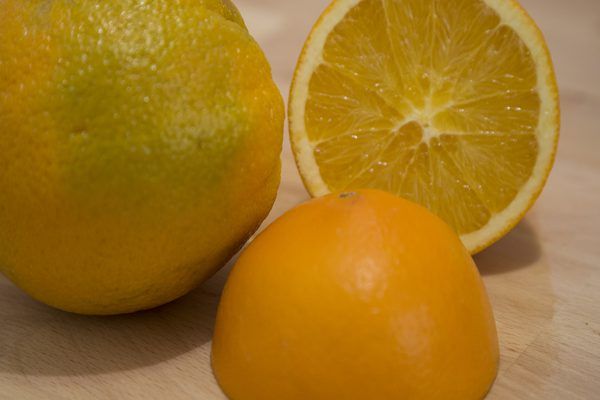As a gardener growing oranges, knowing when to harvest your crop is key to getting the most delicious fruit. After patiently watching your orange trees blossom in spring and tiny green fruits form over the summer, you’ll be eager to start plucking those bright orange beauties But patience is still required, as picking unripe oranges can lead to disappointment. Follow these tips on identifying ripeness signs, variety harvesting times, and proper picking techniques for maximum orange enjoyment
Judge Ripeness, Not Color
It’s tempting to use color as your ripe orange indicator, but orange color alone doesn’t mean the fruit is ready for harvest. Oranges naturally change color as temperatures drop, which often coincides with ripeness but not always. Green oranges are definitely not ripe yet. But a deep orange hue may just reflect colder weather rather than mature fruit.
The most reliable way to identify ripeness is to taste test pick an orange. Use pruning shears to gently clip an orange off the tree. Peel and taste it, watching for these signs of ripe perfection:
- Firm yet yielding texture
- Sweet, juicy flavor
- Abundant citrus aroma
If the orange delights your taste buds, start harvesting If it’s still too tart or dry, hold off a bit longer
Know Your Orange Variety’s Season
The harvesting time frame differs somewhat between orange types. Here are the typical windows:
- Navel oranges – November to June
- Valencia oranges – March to October
- Blood oranges – December to May
- Satsumas – October to January
- Cara cara oranges – December to May
Tracking your variety will give you a ballpark for ripeness. For example, if you have early navels, begin taste testing in November. But always use taste as the final determination, as weather fluctuations can shift timing.
Let Trees Hold Ripe Fruit
A great thing about home orchards is you don’t have to strip trees bare immediately after fruit ripens. Ripe oranges can hold on trees for weeks without issue. Allowing extended tree storage means you can pick perfectly ripe oranges over time rather than wrestling with a huge harvest all at once.
Do watch weather forecasts for any hard freezes and pick all remaining fruit before a freeze hits. Prolonged freezing damages fruit quality.
Use Proper Picking Technique
Plucking firm ripe oranges straight off the tree often works fine. Just be cautious with thin-skinned varieties that puncture easily. For these or high hard-to-reach fruits, use pruning shears to clip the stem cleanly. Try to avoid tearing the orange peel or damaging branches.
You can also carefully shake tree limbs or use a specialized fruit-picking pole to dislodge oranges. Have a tarp ready below to catch any falling fruit. Gather promptly after drop and check for damage before storing.
Don’t Expect More Ripening
Here’s a critical tip – oranges won’t get any sweeter or more flavorful after picking. They only ripen while still attached to the parent tree. So if you harvest too early, you’ll miss out on that orangey goodness. Let them reach their ripe potential on the tree first.
Refrigerate Promptly
Freshly picked oranges hold well at cool room temperature for a week or so. For longer storage, refrigerate harvested fruit right away. Refrigeration slows moisture loss and mold growth, extending fresh life to several weeks.
Enjoy Seasonal Fruit Year-Round
What if you have a orange craving when the trees sit bare? Oranges freeze beautifully, so consider stashing away some of that bumper harvest. Peel, separate into segments, and pack into freezer bags or containers. Frozen orange segments retain much of their flavor and nutrition for use in smoothies, baking, sauces, and other recipes.
You can also try your hand at making homemade orange marmalade for a sweet citrus treat anytime. Capture the fresh flavor in jams, juices, or dried orange slices. With proper planning, you can delight in orchard-fresh oranges all year long.
In short, resist picking underripe fruit too early. Allow oranges time to fully ripen for the best flavor and sweetness. Test taste to identify the ideal harvest moment. Then use proper care in picking and post-harvest storage to enjoy the fruits of your labor for months to come.
How To Tell If An Orange Is Ripe On The Tree
FAQ
How do you know when oranges are ready to pick?
Can you leave oranges on the tree too long?
Do oranges ripen after you pick them off the tree?
How do you know when citrus is ready to pick?
When should you pick oranges?
The fruits should be picked when they start falling down and others that are still on the tree should be plucked down during the first harvest as well. The harvest always increases during the fourth year of fruit-bearing depending on the variety of orange you are farming.
When should I get my oranges off the tree?
But don’t think you have to get them off the tree the moment they ripen. Ripe oranges hold well on the tree for several weeks or more. Get them all off the tree before a major freeze, however. Don’t start pulling off oranges and tossing them into baskets when you see the fruit turn a rich, deep shade of orange.
How do you pick orange trees?
Orange trees can have long seasons so if you want the tree to grow more flowers and fruit, pick fruit early in the season once it is ripe and give your tree the chance to grow more oranges. Oranges are easy to pick by hand by gently twisting them off so the stem snaps.
- A Complete Guide to Caring for Yuki Cherry Blossom Shrub - January 23, 2025
- Identifying Red Hot Poker Seeds: What to Look For When Harvesting Torch Lily Pods - January 23, 2025
- A Complete Guide to Harvesting Evening Primrose Seeds - January 23, 2025

